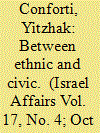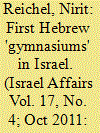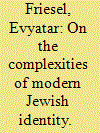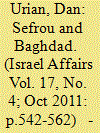|
|
|
Sort Order |
|
|
|
Items / Page
|
|
|
|
|
|
|
| Srl | Item |
| 1 |
ID:
107911


|
|
|
|
|
| Publication |
2011.
|
| Summary/Abstract |
This article addresses two basic issues of the Zionist vision: 1. Was the Jewish state planned as an ethnic or civic state? 2. What was the character of the Zionist vision? Was it a holistic utopian vision, or a minimalist vision for creating a Jewish national state? This research concludes that the state of Israel, which developed from a nationalist ethnic-cultural movement, integrated within it ethnic values as well as Western civic values. The founders of the central wing of the movement all aspired to create a Jewish national state that upheld these values. Furthermore, the planning of the Zionist Utopia by the central group of the Zionist leadership was usually realistic and minimalist, not holistic. This position enabled the leadership to strike a balance between vision and reality, and to address the historical circumstances on the path toward establishment of the state.
|
|
|
|
|
|
|
|
|
|
|
|
|
|
|
|
| 2 |
ID:
107906


|
|
|
|
|
| Publication |
2011.
|
| Summary/Abstract |
This article focuses on one aspect of the Anglo-Israeli relationship, which in the eyes of the Israelis was the main point of concern: the question of British arms sales to the Middle East. It covers the period from the start of the 1950s, when Britain officially recognized Israel, and concludes with the period immediately prior to the Suez War of 1956. During this period, the Foreign Office (FO) was a major force in the formation and implementation of British foreign policy in the Middle East. Central to its role in dealing with British policies towards the region was its effective veto on the sale of British weapons to the Middle East region. The article argues that during this period the FO was extremely flexible in sanctioning the sale of arms to its Arab allies, but did not offer the same flexibility in dealing with potential British arms sales to Israel.
|
|
|
|
|
|
|
|
|
|
|
|
|
|
|
|
| 3 |
ID:
107913


|
|
|
|
|
| Publication |
2011.
|
| Summary/Abstract |
This study examines the effect of electoral victory in 1988 and electoral defeat in 1992 on the party organization structure of Israel's Likud Party. Until recently, most researchers on party organization claimed that electoral defeat causes organizational change, while other scholars found that victory, too, can generate change in party organization. The present article studies the effects of electoral defeat versus electoral victory on party organization. Findings reveal that, following victory, the Likud became more factional, with intra-party power struggles, leading to a more equal distribution of power. Electoral defeat changed the dominant coalition and leadership, resulting in a more oligarchic structure.
|
|
|
|
|
|
|
|
|
|
|
|
|
|
|
|
| 4 |
ID:
107914


|
|
|
|
|
| Publication |
2011.
|
| Summary/Abstract |
This article traces the establishment and development of the first Hebrew 'gymnasiums' (academic high schools) during the years 1906-1948: Gymnasia Herzliya, the Hebrew Gymnasia in Jerusalem, and the Reali School in Haifa. It describes how they were set up during Ottoman rule, and their development during the British Mandate up to the establishment of the state, focusing on school culture as it was expressed in both the formal and informal educational systems.
|
|
|
|
|
|
|
|
|
|
|
|
|
|
|
|
| 5 |
ID:
107907


|
|
|
|
|
| Publication |
2011.
|
| Summary/Abstract |
The contention of the present essay is that many Jews who oppose the existence of the state of Israel express a problematic form of Jewish identity, which may reach the point of a new pattern of Judeophobia - certainly, a puzzling intellectual phenomenon. Excluded from this category are Jews who criticize certain Israeli policies; this is the accepted democratic and liberal norm. Meant are Jews who either demand structural changes that deny the Jewish character of Israel, or even support the so-called 'abolishment' of the Jewish state. Even if their number is small, the visibility and influence of such Jews are quite large. Although most of them indignantly reject the allegation of Judeophobic attitudes, they frequently find themselves on a common platform (at times literally so) with declared and active non-Jewish Jew-haters, who are never shy to use their Jewish companions for their own argumentation.
|
|
|
|
|
|
|
|
|
|
|
|
|
|
|
|
| 6 |
ID:
107909


|
|
|
|
|
| Publication |
2011.
|
| Summary/Abstract |
This article examines states' voting records at the United Nations Human Rights Commission/Council during the period 1992-2008 on resolutions targeting specific countries, and tests competing hypotheses about voting behaviour derived from liberal and realist theory. I conclude that a liberal framework explains voting behaviour on resolutions addressing most states and show that democracies were more likely than non-democracies to support resolutions criticizing states with poor human rights records. However, I also show that the liberal framework fails to explain voting behaviour on resolutions addressing Israel because the issue uniquely polarized states according to geo-political groupings - Western democracies often opposed resolutions addressing Israel, but developing world states often supported these resolutions. These findings hold for both the Commission and its successor body: the Human Rights Council.
|
|
|
|
|
|
|
|
|
|
|
|
|
|
|
|
| 7 |
ID:
107915


|
|
|
|
|
| Publication |
2011.
|
| Summary/Abstract |
This article provides data and insights into Israeli public opinion about the welfare state and social policy. The study included 940 respondents who reported their attitudes towards various issues related to the welfare state. The study was conducted in spring 2008 prior to the current economic crisis. The findings show that, to a large extent, the Israeli public justifies state intervention in the supply of public services, supports public investment in services related to the welfare state, and recognizes the obligation to support those in need. As for various policy areas, the Israeli public regards education as a top priority, believing that investment in public education is likely to lead to achievements in other areas such as security and health. However, when asked about their willingness to pay more taxes for services related to the welfare state, respondents tended to be less enthusiastic. The research points to a significant gap between the social and economic policies in the past decade and the attitudes of large parts of Israeli society towards the welfare state. We provide possible explanations for that gap.
|
|
|
|
|
|
|
|
|
|
|
|
|
|
|
|
| 8 |
ID:
107910


|
|
|
|
|
| Publication |
2011.
|
| Summary/Abstract |
Since the beginning of the 1980s Mizrachi theatre practitioners have confronted the problem of community segregation and the ways in which Mizrachi characters are represented. Gabriel Ben-Simchon and Sammy Michael represent two approaches chosen by playwrights and story-tellers of eastern origins (from Arab countries) in their confrontation with the changes that have taken place among their groups and with the stereotyping of these groups. These two approaches are: anti-stereotyping and specific individualization. Michael has chosen a detailed and intrusive characterization, and his characters feature elements of: beauty, ugliness and, mainly, humanity. In contrast, Ben-Simchon, in his plays and stories, has chosen the anti-stereotype as a paradigm that distances his Moroccan-Jewish characters from reality and sends them soaring into a legendary world. Both these playwrights are fully integrated into Israeli society and culture. They have separated from the past (willingly, or nostalgically), but have not shaken off their Arabic cultural links and preach for a shared future by Jews and Arabs in a modern state.
|
|
|
|
|
|
|
|
|
|
|
|
|
|
|
|
|
|
|
|
|